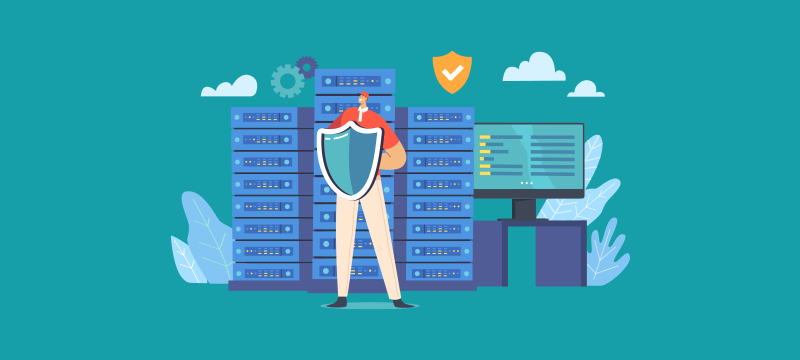VPS houses your sensitive information and programs, it is crucial to safeguard and maintain it secure at all times. Even though VPS hosting is renowned for its strong security, there are still some flaws you should be aware of. Malware, SQL injections, viruses, online attacks, cross-site scripting, a lack of function-level control, and poor credentials are common cyberattacks and problems to be aware of. In this post, we will highlight 7 ways to secure your VPS so that you can avoid getting hacked.
The default SSH (Secure Shell) login can be modified
To connect remotely from one system to another, many users utilize SSH to log on to their computers. You run the danger of falling prey to a cyber attack if you connect to the server via SSH. An online attack is typically when multiple popular passwords are used to attempt to access your SSH server. The best solution is to edit the SSH 22 port default login password to a personalized one specifically for this purpose. Strong passwords typically combine letters, numbers, and special characters in both lower and upper case.
Log into your virtual private server (VPS) and track down the file /etc/ssh/sshd_config to modify the default SSH password. Now, edit PermitRootLogin’s default value to NO (If it is valued at Yes). SSH key authentication, which is more dynamic to online attacks than password verification, maybe a better option for advanced protection. However, note that you might lock yourself out of VPS if you turn off root logins without first assigning permitted access.
Ensure that software versions are up to date
The older the software version, the more VPS is prone to attacks. Fortunately, running the required updates for your OS (operating system) only requires a couple of minutes. Perhaps you might think about automating this procedure. You’ll most likely utilize Ubuntu or yum/rpm for CentOS or apt-get for Debian for the system updates.
You can utilize Cron jobs, a Linux application that sets a command on the VPS to execute updates on a specific date and time, or even the control panel can automate this. If you utilize a CMS (content management system), it is recommended to look for updates on a frequent basis and to install them as and when they are available along with updating the server-side software.
Check the logs on your VPS server.
Overlooking the activities going on in your VPS is made easier by managing your server logs. You’ll be more ready for the problems that arise if you keep track of your VPS software and systems. You are more equipped to manage the problems at hand when you actively monitor events, bandwidth usage, visitor activity, resource utilization, and software-generated faults.
Being aware of the problems at hand may only assist in handling them more quickly, whether it be through prevention or resolution. Also, set up email alerts for any faults and warnings to enable actual event monitoring.
Defend against cyber-attacks
Online attacks take place when cybercriminals find poor passwords giving the hacker total access to the VPS. Regrettably, having a strong password is no longer sufficient. Also, you will require apps that can identify brute-force attempts and prevent unpermitted logins. A prime example is the functionality called cPhulk that is included in cPanel.
After multiple unsuccessful tries, cPhulk assists in blocking logins and blocks not just cPanel logins but also FTP, WHM, and email-based ones. It is advised to use the Login Failure Daemon, or LFD, that routinely scans for risks to your VPS. LFD looks for unpermitted attempted logins and blocks the IP address that is trying to attack the server. LFD will also notify you if a login attempt succeeds or fails.
Manage control access
You can select the distribution of control that best suits your preferences in the pursuit of VPS security. In simple words, the operational zones for your users. In the hypothetical case where several users access your VPS. Here, you might want to restrict their access in order to safeguard sensitive data and stop them from altering how you use your resources. Search for file systems like CageFS (CloudLinux) or VirtFS to accomplish this. Both enable you to keep your users segregated within a particular set of resources and files.
Maintain regular backups
Backups, and even better, automatic backups are essential for all hosting types, not only VPS hosting. Many individuals neglect to regularly back up their data, which they later regret when something goes haywire and they are left without a copy. There is always a risk that anything could go wrong, regardless of how cautious you are.
Even if your hosting provider backs up your data, it is always better to have a backup of your own. In case the server experiences an issue, backups should ideally be placed somewhere that is safe and most importantly other than the server.
Make use of SSL certificates
To protect your privacy, SSL certificates enable you to establish an encoded connection between the customer and the server. SSL certificates are essential for not just VPS hosting but every type of hosting, whether you’re sending information, emails, files, or inputting login information, in order to keep your critical data secure.
Yet, a certain level of technical expertise is needed to successfully install the SSL certificates. A system executive can set things up for you in this situation, allowing you to relax and focus on core functions.
Conclusion
Server infrastructure flaws can have disastrous effects. The internet is home to multiple hackers that are constantly searching for even the smallest security flaws in your VPS. You must protect your virtual private server (VPS) from potential attackers. The security tips that have been mentioned in the post above will enable you to secure your VPS hosting account at all times.
For more information on how our VPS hosting solutions can be beneficial, economical, and secure for your business, please visit our Linux VPS Hosting page.
